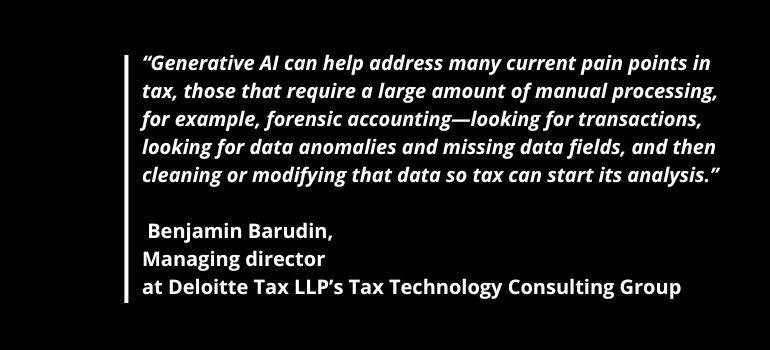In the rapidly evolving digital era, the integration of generative AI into tax departments is setting a new standard for operational efficiency and insight generation.
With the ability to process and analyze vast amounts of data in innovative ways, generative AI is revolutionizing the way tax professionals interact with data.
As highlighted by Richard Littleton of Deloitte Tax LLP’s Tax Technology Consulting group, this technology enables faster engagement with data, driving insights in areas previously bogged down by time-consuming processes.

The Revolution of Generative AI in Tax Operations
The introduction of generative AI in tax departments heralds a significant leap towards digital transformation. This technology’s capacity for creating new content from existing data means tax professionals can now achieve deeper insights with less effort, expanding the scope and impact of tax departments within their organizations.
Pioneering Effective Use Cases for Generative AI in Tax
Identifying and developing initial use cases for generative AI in tax operations is critical. Collaborations with non-tax functions to streamline processes such as forensic accounting demonstrate generative AI’s potential to significantly reduce manual processing. Benjamin Barudin, from Deloitte Tax LLP, in the recent audio podcast on the topic emphasizes how generative AI can facilitate anomaly detection and data cleaning, paving the way for more efficient analysis.
Furthermore, generative AI enhances financial reporting analysis. It simplifies data mining from various sources, allowing tax professionals to easily query complex information, like effective tax rates by jurisdiction, through natural language questions.

Overcoming Challenges in Implementing Generative AI
While the benefits are clear, integrating generative AI into tax systems presents challenges, including the need for new skill sets to address inaccuracies and biases in AI-generated information. Ensuring the seamless operation of AI applications within the tax ecosystem is imperative for success.
The Future of Tax Departments with Generative AI
As generative AI continues to evolve, its role in fulfilling regulatory requirements and improving operational efficiencies in tax departments becomes increasingly significant. The path forward involves integrating AI solutions into the existing tax technology ecosystem, a challenge that, if navigated successfully, promises a future of enhanced efficiency and strategic insights for tax departments.
In conclusion, the adoption of generative AI by tax departments is a transformative movement towards more efficient and insightful tax operations. Through strategic development of use cases, addressing implementation challenges, and fostering interdepartmental collaboration, tax leaders can harness the full potential of this technology, contributing to their organizations’ broader strategic objectives.
If you aspire to emulate the practices of leading corporations, NextBrain AI offers the opportunity to employ AI for your business data analytics without requiring advanced technical expertise. Schedule a demo today to witness its application in enhancing your business strategy.


 +34 910 054 348
+34 910 054 348 +44 (0) 7903 493 317
+44 (0) 7903 493 317